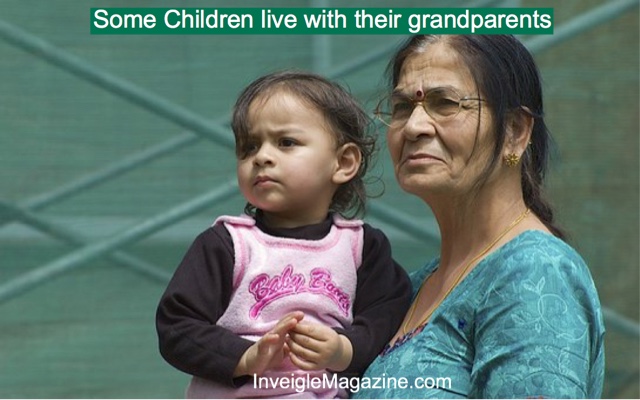Reciprocity or mutual aid was the predominant social welfare arrangement of the colonist until the implementation of the Elizabethan Poor Laws. Individuals who share a sense of identity are more inclined to work toward the common good; however, such groups typically meet others with different characteristics, values, and beliefs with suspicion. The competition for finite resources and opportunities is a potential source of melee, mayhem, and social ostracism. Therefore, with the population numbers rising, the colonist established the Colonial Poor laws, which were patterned after the Elizabethan poor law of 1601. Prior to the implementation of the poor laws, the bases of support rested first on family and the community; parents were responsible for their children, and children were responsible for their's aging parents and grandparents.
 |
| Children may end up taking care of aging parents |
The unworthy poor were individuals who just flat-out refused to work; you know, the type of people who want something for nothing!
Growing up in the south, I was always told, "people will help you if they see you trying to help yourself!" I truly believe that people are more likely to help individuals who are trying to make an honest and decent living or who are trying to make something out of themselves. It is my belief that the current social welfare system is designed to give able-bodied people a," hand up and not a handout."
Advertisement
The Great Depression was an economic crisis beginning after the stock market crashed on October 14, 1929; lasting for ten years, and ending in 1939. Many Americans ridiculed President Hoover for his lack of ambition and were dissatisfied with his efforts to bring the country out of the economic and social crisis. Herbert Hoover lost the presidential election of 1932 to Franklin Delano Roosevelt.
Advertisement
The Area of The Great Depression: The Birth of Social Security
During the economic downturn, many found they selves unemployed; women who had traditionally been the homemakers had to venture out into the workforce occupying positions that were historically male-dominated for lower wages.
Farmers lost land and machinery, and many who farmed in the region known as the dust bowl could no longer make a living on the land due to a drought. Although black Americans were no strangers to economic hardship, their economic and social conditions worsened, and many who worked as farmers and farm laborers no longer had that option; however, many found labor under harsh and dangerous working conditions. Suicides increased during the great depression; suicides increased as unemployment increased.
Social Security Act
On August 14, 1935, President Franklin D. Roosevelt signed
the Social Security Act. Social security is one of the most effective anti-poverty programs in
U.S. history.
The primary objectives of the social security act of 1935 are to
reduce poverty for the
- elderly,
- children,
- and the disabled.
Although not perfect, I personally would like to believe that we Americans have the best social and economic systems in the world and that one day someone will come along and fix all of the imperfections that exist within the various macro and microsystems that exist to provide a safety net, promote social and economic prosperity, and equality.
Social Security Critics Argue :
- The social security trust fund will run dry before the younger generation has an opportunity to collect on benefits due to the increasing numbers of baby boomers collecting on current benefits. Social security transfers wealth from the young to the old.
- A great number of people die before reaching the age of retirement; therefore, it's a bad investment.
- People should be allowed to invest their hard-earned money in the manner in which they see fit; they can get better returns from the stock market. Therefore, people should be educated in basic investment strategies.
- People need their money now!! The government should not force people to save for retirement!!
- A study suggests that lower-wage earners tend to fare better than higher earners, but blacks tend to fare worse than their white counterparts; according to an article published by the New York Times," To social security critics, the argument is simple."
Social Security Supporters Argue :
- The program does not contribute to the deficit. It is self-sustaining through payroll taxes.
- Social security is not just about the elderly; millions of kids benefit from social security, children who have lost a parent, and those who live in the households of grandparents, in which social security is the primary source of income.
- Social security provides benefits for the disabled, and it is the only safety net that most people have.
 |
| Some older adults are taking care of their grandchildren while they are on Social Security |
I have researched both sides of the coin, and both sides present some fascinating arguments and resolves; for example,
A few of the proposed solutions are as followed:
- Personal retirement accounts in which some of the money is diverted to individual retirement accounts.
- Advocates against the current social security system propose that the system self-invest funds directly into the market.
What is your proposal; how do you feel the U.S. government should resolve this issue? Write your comments.
Author on Inveigle Magazine
Author: Gregory M. Green is the author of various topics in the Social Sciences section of Inveigle Magazine. He writes on informative topics that bring awareness to the world. We are so pleased to have him as a part of Inveigle Magazine's Team. Follow us @Inveiglemagazi1 View more articles by Gregory M. Green
Inveigle Magazine




